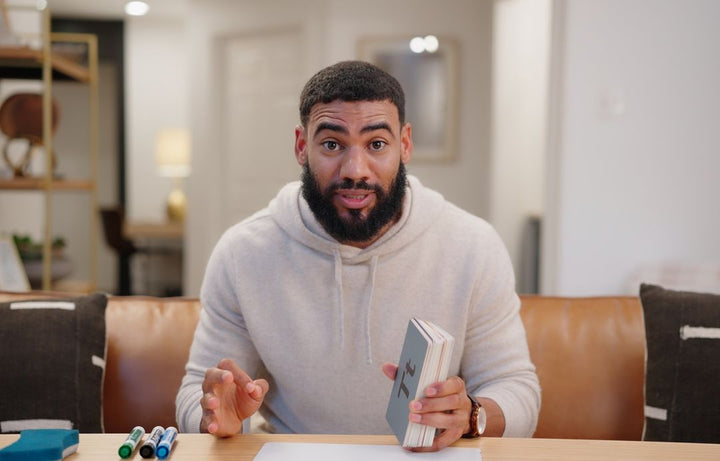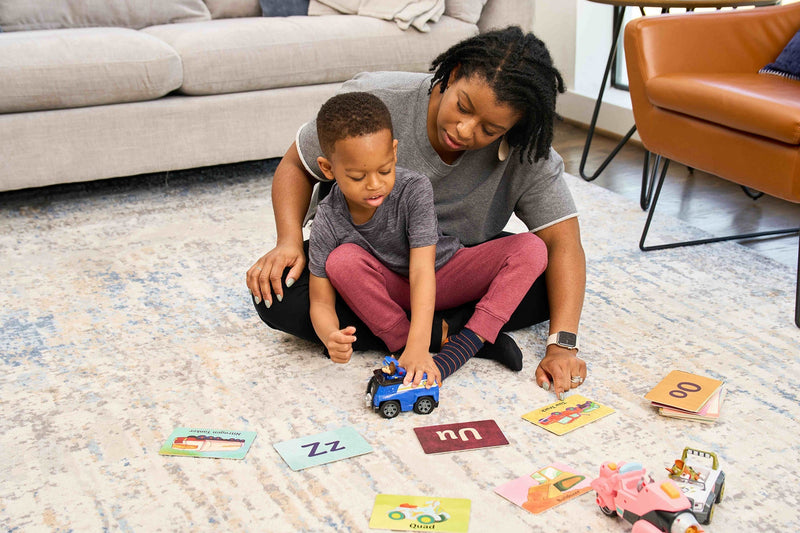When I tell folks that they can teach their child how to read at home, a lot of them assume it will take hours each week—which makes it seem pretty overwhelming.
But I promise, you can accomplish a lot with your little one in much less time than you think! In this blog post, I'm going to cover exactly how long you actually need to spend practicing each day to get your little one reading.
If you think you're too busy, you're right.
First things first: Our beliefs shape our reality. So if you don't think you have the time to teach your child to read, you can stop reading here. Because you're right. If that's your mindset coming in, then you don't.
And likewise, if you do believe you have enough time to teach your child to read, then you're also right.
If you follow these 3 simple steps, you'll leave with a solid plan for getting started with your little one. And, it takes a lot less time than you might think!
Step 1: Choose 4-6 practice days.
I suggest setting aside at least 4 days a week to work with your child. Why don't I recommend practicing for just 2 or 3 days?
Well, pretend you're teaching your little one their letter sounds and this is your schedule and plan...
- Session 1: Sunday- Let's say you introduce 3 sounds, show pictures on letter cards and say words that start with those sounds. Everything seems good so far.
- Session 2: Tuesday- Now, you review those same 3 sounds, but they only remember 1 of the 3 from Sunday. So you work on the sounds some more until they know all 3!
- Session 3: Friday- You start off by reviewing those 3 sounds again, but it's been a few days since you've practiced and again, they only remember 1 of the 3 sounds.
And this is just one example of a weekly schedule. Even if you chose Wednesday for the 3rd session, you would probably spend most of the time reviewing the letter sounds you've already taught instead of teaching them new letter sounds. Adding one or two more days/week will make a huge difference in their ability to remember the sounds from session to session.
I know four days a week might seem like a lot, but the frequency of practice time will make a big difference in how much your child is able to remember. If you do less than 4 days a week, you'll spend most of the time reviewing old skills instead of moving onto the next stage.
This doesn't have to be perfect math, there will be some weeks that you don't get 4 sessions and some that you get 6- the important thing is to stick to the minimum most of the time.
Step 2: Practice 5-10 minutes/day.
My recommendation is to practice for a total of 5-10 minutes on the 4-6 days that you choose.
Now I know that every kid is different and there are going to be lots of things that influence the exact amount of time you should be practicing- things like their age, ability, focus, screen time, and so many other factors. But generally speaking, 5 to 10 minutes is usually enough.
You might be thinking that if a child would learn faster if they practiced more than 10 minutes. But I want you to be careful not to push your child past 10 minutes of learning time unless you are confident that they enjoy it and are capable of it.
The truth is that if we spend longer than 10 minutes, there's a strong chance our little ones will lose interest and won't be able to focus. This can lead to frustration for both of you, and might even make your child resent the learning time.
If shortening the learning time means that the few minutes you have together are much more productive, then by all means shorten the learning time. Sometimes less is more.
Step 3: Stick to a routine
Your routine doesn't have to be perfect but I want to be clear: you will have to find one that you can stick to. I will share two types of routines that I've seen work well with families.
Type 1: The SchedulerIf you're anything like me when you're starting a new routine- you need time blocked out on your calendar because you need structure in your life. If you're a scheduler, I recommend picking a specific time of day that is most reasonable to stick to for those 4-6 days of the week. It helps to "habit stack," which is when you combine a new routine to an existing one. If you pair this new practice time with something that is already going to happen, it makes it less overwhelming and works as a built in reminder.
Maybe you know for sure that you can commit to a few minutes a day before bath time, or as they're eating a snack after daycare. You'll want to think about what works best for your child and your schedule. You'll also want to consider how each of you feels during this time of the day.
For me and my son, we started off by practicing for 5 minutes after dinner 4 or 5 days a week. I was able to relax because I was done with work, and my son was happy because he was full from dinner. This time of day worked best for both of us so we could make the most of those 5 short minutes.
Here are 3 examples from families in my courses:
- Bath time- this might surprise you, but it works for so many because their little one is confined and the parents have to monitor them anyhow so it is a win-win.
- Sibling sport practice- when families have more than one child, they will often take advantage of the time with the youngest while the older children are occupied.
- Morning breakfast- for those who aren't headed to work or daycare first thing, mornings during or right after breakfast work well because that is when many parents say their child is in the best mood.
You might need to hear this if you are a scheduler: It is OKAY to change the time of day you practice if either of your needs change. For example, when I started a new job, I didn't have as much time to practice after dinner. Since the routine I had set up with my son didn't work for us anymore, we started practicing for a few minutes before he left for school everyday. There will be an adjustment period each time you change up the routine.
Maybe you aren't like me and the thought of blocking out the same time everyday stresses you out- but you're still committed to putting in the time. I have a routine that will work for you too.
Type 2: The "get in where it fits in."If 5 solid minutes at the same time each time just won't work for your personality or family's needs- that is okay. Instead, you would find different points throughout the day to spend 30-60 seconds working on reading that add up to 5 minutes each of those days. This doesn't have to be at the same points everyday, just whenever you get the chance.
For example, if one day you have an extra minute before you need to leave for soccer practice, you spend it reviewing a letter sound they haven't mastered yet. Or on another day, you might have a couple minutes in the car to practice blending out loud.
This is about finding little pockets of time throughout the day to include reading practice that will add up a lot faster than you expect. A minute here and 30 seconds there can total to 5 minutes easily by the end of the day- and the progress you'll see in that amount of time will be incredible.
As long as you are consistently working up to 5 minutes, it isn't any different than "The Scheduler" type. Your little one will get used to working on reading when they have extra time, and those short practices can even work to your advantage if you have a little one who doesn't want to focus for very long.
No matter what you choose, figure out what works best for you and your child, and stick to it. If you want to see your child make progress, consistency is key.
How you teach > How long you teach
I know that figuring out how to teach your child to read can be overwhelming, and it's hard to figure out what advice to take. But if there's one thing I want you to take away, it's this:
The quality of the learning time will always be more important than the amount of time you spend.
It does not matter if you keep the most consistent schedule on the planet- if you hold doubt in your child's ability to learn or your ability to teach them, they will not learn how to read. It does not matter if you can get your child to sit still and focus for 2 hours everyday- if you aren't teaching them how to read correctly, they will not learn how to read. There is no amount of time that will make up for bad teaching.
And if you're worried that you don't know how to teach your child the right way, I'm here to help. My free Beginning Reading Workshop has helped thousands of parents get started with their little ones at home. Speaking of time, did I mention that it can do this in just 30 minutes?

If you were on the fence or stuck getting started teaching your little one to read because of time concerns, I hope this has helped you put together a plan that fits your life. Teaching my child to read built such a special bond because of the consistent time we had together, and I promise you it is a lot simpler to fit into your life than you might think.









